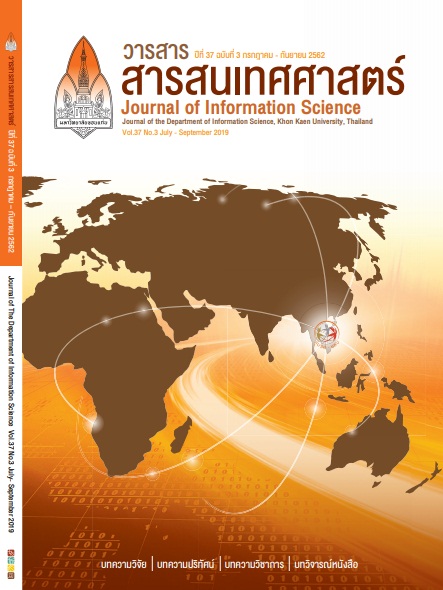Assessment of Information Literacy and Self-Efficacy Northeastern Rajabhat University
DOI:
https://doi.org/10.14456/jiskku.2020.7Keywords:
Assessment of information literacy, Self-efficacy, Undergraduate studentAbstract
Purpose of the study: This research aimed to study the assessment of information literacy and the self-efficacy’s learners in Northeastern Rajabhat Universities.
Methodology: The research tools used in this research was the questionnaire which involved the information literacy skills and the self-efficacy by using the self-efficacy standards of higher educations and the self-efficacy’s Bandura Theory.
Main Findings: The result revealed that the students in Northeastern Rajabhat Universities had the information literacy in overall at above average level. When considering in each standard found that the respondents had the information literacy in all standards at above average level. The highest-level standard was the students had the competency to access the information literacy efficiently and effectively. Regarding the low-level standard was the students could explain or identify the information literacy needs and the self-efficacy of the students was overall in the moderate level. When considering in each item found that the self-efficacy “Failure keeps me fighting” was in the highest value. In the low-level item, which also evaluated it in level disagreed, it was “the students did not accept the problem making by themselves.”
Applications of this study: It could take the results to develop innovation. This model learning could apply in teaching for the learner’s needs in order to promote information literacy and the self-efficacy.
Downloads
References
American Library Association. (2000). The information literacy competency standards for higher education. Retrieve 19 August 2018, from http:// www.ala.org/acrl/standards/informationliteracycompetency
Bandura, A. (1977). Social learning theory. Englewood Cliffs, NJ: Prentice-Hall.
Bandura, A. (1986). Social foundations of thought and action: A social cognitive theory. Englewood Cliffs, NJ: Prentice-Hall.
Bent, M., & Stubbings, R. (2011). The SCONUL seven pillars of information literacy. London: Core Model for Higher Education.
Catts, R., & Lau, J. (2008). Towards information literacy indicators: conceptual framework paper. Paris, France: UNESCO.
Chettabut, K. (2009). Information Literacy: Learning skills. UDRU research journal, 1(2): 12-15.
Hamilton, B. J. (2009). Transforming information literacy for nowgen students. Knowledge
Japakeeya, N., Khamkaew, C., & Maso, Z. (2014). Development of Information Literacy Skills of Students in Higher Education Institutions in the Three Southern Border Provinces. Master’s thesis, Print of Songkhla University, Pattani Campus.
Khunrit, B. (2016). The academic self-efficacy and adversity quotient of student in program business computer, Suan Dusit University, Trang Center. The 7th Hatyai National and International Conference. (1055-1064). Songkhla: Thailand.
Krejcie, R. V., & Morgan, D. W. (1970). Determining sample size for research activities. Educational and Psychological Measurement, 30(3), 607–610.
Miltiadou, M. (2001). Motivational constructs as predictors of success in the online classroom. Dissertation Abstracts International, 61(9-A), 3527.
Neely, T.Y. (2002). Sociological and psychological aspects of information literacy in higher education. Lanham, MD: Scarecrow Press.
Pajares, F., & Miller, M. D. (1994). Role of self-efficacy and self-concept beliefs in mathematical problem solving: A path analysis. Journal of educational psychology, 86(2), 193.
Prathanrat, P. (2014). Need in developing information literacy skills for undergraduate students at north-chiang mai university. Master’s thesis, Chiang Mai University. Chiang Mai. Quest, 37(5), 48-53.
Rohatgi, A., Scherer, R. & Hatlevik, O. E. (2016). The role of ICT self-efficacy for students’ ICT use and their achievement in a computer and information literacy test. Computers & Education, 102, 103-116.
Schunk, D. (2000). Motivation for achievement: Past, present, and future. Issues in Education, 6(1/2), 161-166.
Suphan, S. (2013). Information Literacy of students at Rajamangala University of Technology Isan Kalasin Campus. Kalasin: Rajamangala University of Technology Isan.
Veerachard, J. (2012). The effects of learning factors toward information literacy skills of undergraduate students at dhurakij pundit university. Master’s thesis, Burapha University.








